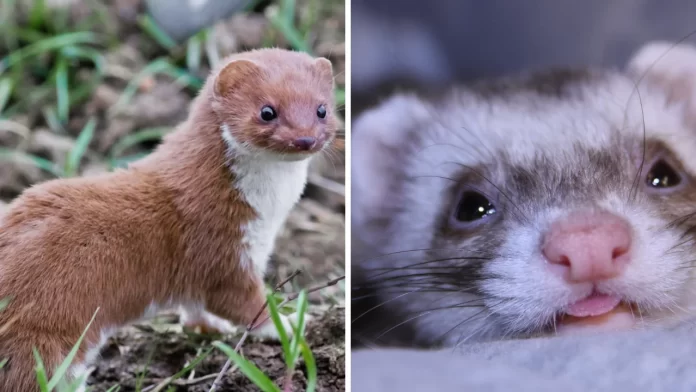Last Updated on November 7, 2023 by Fumipets
Weasel vs Ferret: What’s the Difference?
Weasels and ferrets are both small carnivorous mammals belonging to the Mustelidae family, but they differ in various aspects, including size, behavior, and domestication. Understanding these differences can help in distinguishing these fascinating creatures.
Weasel vs. Ferret
Despite having similar behaviors and appearances, weasels and ferrets are quite distinct creatures. Weasels are normally far more violent while hunting than ferrets, which are typically a bit bigger. Both of them are adorable and seem to be cuddly, yet the weasel is not quite as affectionate as the ferret.
Learning about the distinctions between the weasel and the ferret is particularly important if you’re thinking of getting one as a pet. For you, we’ve put up an informative primer on the distinctions between weasels and ferrets. You ought to be fully informed on the differences between the ferret and the weasel by the end of this tutorial.
Visual Differences
The ferret tends to be bigger and longer than the weasel, which is the first obvious distinction between these two species. Additionally, their legs are longer than weasels’. Weasels have lighter brown or beige coats and white underbellies, whereas ferrets have black or dark brown coats that sometimes contain cream markings. Typically, a weasel’s tail is longer than a ferret’s. Additionally, while both ferrets and weasels have tubular bodies, ferrets are often smaller than weasels.
At a Glance
The Weasel
- Average length (adult): 4-12 inches
- Average weight (adult): 1-13 ounces
- Lifespan: 4-6 years
- Exercise: 2+ hours a day
- Grooming needs: Minimal
- Family-friendly: Yes
- Other pet-friendly: Sometimes
- Trainability: Poor
The Ferret
- Average length (adult): 13-15 inches
- Average weight (adult): 5-4.5 pounds
- Lifespan: 5-10 years
- Exercise: 2+ hours a day
- Grooming needs: Minimal
- Family-friendly: Yes
- Other pet-friendly: Often
- Trainability: Moderate
Weasel Overview
Weasels are often wild animals that are tiny yet vicious hunters. Weasels are renowned for devouring mice, birds, and rabbits, but certain species are capable of killing and devouring food that is up to ten times their size! Weasels have a daily caloric intake that may reach 50% of their body weight. Due of their strong prey drive, they will hunt even if they are not hungry. They’ll see any little moving object as prey if it’s nearby.
Since weasels are real carnivores, neither in the wild nor in captivity, you won’t see them gorging on any fruits or vegetables. If properly socialized from the time they are newborns on, they can get along with people and other bigger animals. They prefer to be left alone, as they would in the wild, if anything else. Weasels are able to hurt pups and kittens if they feel threatened, so prospective owners should be aware of this. Before bringing a weasel into the home, cats and dogs should be fully grown.

Personality / Character
Weasels are energetic tiny creatures who do not snooze much while they are awake. These creatures may be seen dancing, exploring trees for bird eggs, or creating tunnels to sleep in when they are not out hunting. But they hunt the majority of the time. Even when they are not hungry, they will hunt, and they will store the food nearby their nest or burrow for later. Before attacking their target, weasels are renowned for doing a “war dance” to confound and captivate them.
Although they like to live as pets in captivity, weasels are not very affectionate animals. Weasels should not be kept as pets since they have not been tamed, according to the majority of specialists. In fact, several states in the United States forbid keeping weasels as pets. The most content weasels are while living in the wild. Their lethal methods might be quite harmful in the home.
Health & Care
Weasels often live longer in captivity due to the dangers of the wild. Due to the fact that they consume a natural diet consisting of recently slain animals rather than commercial diets created by humans that include grains, fillers, and artificial components, they are not as susceptible to health problems as pets like dogs and cats are.
There are no beds, diets, or habitats made specifically for weasels since they are not commonly kept as pets. However, those who insist on keeping weasels as pets may provide for them by using supplies intended for ferrets.
Suitability
Weasels are best suited for the wild, to put it simply. Since they can adapt to practically every kind of environment and climate, they may be found, to mention a few locations, in the grasslands of Asia, the forests of Central America, and the deserts of North America. Almost anyplace in the globe, even places where it snows all winter, is livable for them. If they are kept as pets, they should only have one other pet and be constantly watched while they are out of their confined environment.
Ferret Overview
Ferrets resemble weasels in appearance, but they are tamed animals with far lower levels of hunting drive. They may live contentedly as pets in a family home, whether or not there are other pets present. Like weasels, they are carnivores, but they don’t strive to hunt down every moving object.
These creatures scamper about with elongated bodies. They are swift animals that may dart from one area to another so rapidly that some owners find it difficult to keep track of them. This is due to their thin legs. They are notorious for making people laugh despite having little bodies and enormous personalities. Although ferrets are often friendly animals, they may bite if they feel threatened.

Personality / Character
When kept in confinement, the sociable ferret likes interacting with people and other animals. They are kind yet fun, and when no one else is there to hang out with, their curiosity keeps them occupied. These animals don’t mind spending some time in a cage, which makes it simple to control them while guests are visiting.
Like weasels, ferrets are carnivores, but unlike weasels, they will consume almost everything they can get their paws on. As a result, they should never be left alone when no one is home to supervise them. These animals may be trained to do feats like sitting on their owner’s shoulders and saying “coming.”
They get along nicely with household pets including cats, dogs, other ferrets, and children. When around creatures that are tiny enough for ferrets to become prey, such rabbits and hamsters, they may even become buddies. However, they should always be under supervision.
Health & Care
Ferrets should see a vet often to maintain their best health throughout time. They should get annual rabies and distemper vaccinations, much as other domesticated animals. Once they are familiar with their owner, they will consent to have their nails cut sometimes, preventing them from leaving paw prints on the furniture.
These creatures should only consume meat, such as chicken, beef, hog, turkey, bison, or other domesticated animals. Many meals, like Marshall’s Premium food, are available at pet supply shops and online specifically for ferrets. When spending time in their little environment, ferrets like lying on soft bedding, playing with toys, and sleeping in soft beds.
Suitability
All sizes of houses are suited for ferrets. If there is no tormenting or chasing going on, they do not mind children being around. However, they also don’t mind spending time alone in the security of their caged home. They like spending time with friendly cats and quiet dogs. Additionally, they can adjust to most social settings, which makes them the star of the party when guests come.
Which Animal Is Right for You?
Weasels and ferrets are both adorable and closely related, but although the ferret has been tamed for many years, the weasel is still in the wild. Except for a few states like Hawaii and California, which prohibit them, ferrets are available at pet shops around the country.
Weasels, on the other hand, are difficult to locate unless they are offered for sale by hunters who catch them in the wild. Focusing your attention and efforts on a lovable ferret is strongly recommended if you want to take a weasel or ferret home. Please feel free to share your opinions with us in the space provided below for comments.
Questions and Answers About Weasels and Ferrets:
What is a weasel?
A weasel is a small, slender, and carnivorous mammal known for its agility and hunting skills. They are wild animals and come in various species, including the least weasel and the stoat.
What is a ferret?
A ferret is also a small carnivorous mammal and a domesticated subspecies of the polecat. Ferrets are kept as pets and used for hunting purposes, primarily in controlling rodent populations.
How do weasels and ferrets differ in size?
Weasels are generally smaller, with some species measuring around 6-8 inches in length. Ferrets are larger, with an average length of 18-24 inches, making them more substantial than weasels.
What about their behavior?
Weasels are primarily solitary, territorial animals that hunt for their food. Ferrets, on the other hand, are social animals when domesticated and are often kept in pairs or groups. They have been bred for a more docile and playful temperament.
Are they related?
Weasels and ferrets are both part of the Mustelidae family, which includes various carnivorous mammals. Ferrets are domesticated polecats, a closely related species to wild weasels, but their behaviors and sizes have been significantly influenced by selective breeding.
In summary, weasels and ferrets share a family and carnivorous nature, but they differ in size, behavior, and domestication status. Weasels are wild, agile hunters, while ferrets are larger, domesticated animals bred for companionship and hunting purposes. Understanding these distinctions can help in recognizing and appreciating these intriguing creatures.


















